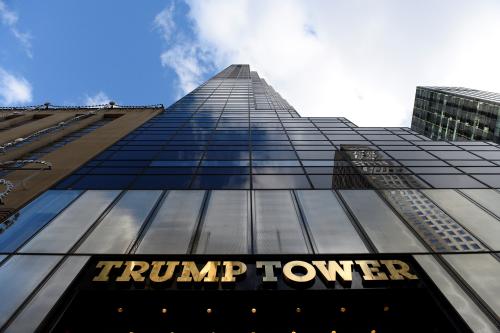As week two of the impeachment saga unfolded, the White House refused to answer any congressional inquiries, the president precipitated a war in northern Syria, polls showed very small and maybe inconsequential public movement in favor of impeachment, and a court ruled that Donald Trump had to hand over his personal and business tax returns.
The question on everyone’s mind has become “What would it take for enough Republicans to abandon Trump?” The important word here is “enough,” and defining that requires some history. When Richard Nixon resigned ahead of impeachment and conviction, he had an approval rating of about 25 percent in the larger public which translated to a 50 percent approval rating among Republicans.
Since his election, Trump’s average approval rating overall has hovered between a low of 37.2 percent and a high of 44.9 percent. But he still has high approval ratings among Republicans—in 2019 alone, these run from a low of 87 percent to a high of 91 percent. So one very important number to watch is how Republican voters feel about Trump because that will be one of the influences (although not necessarily the definitive one) on Republican members of Congress.
In answering that, it’s important to remember that the Republican Party is not a monolith. Like the Democratic Party, it is a “big tent” composed of various factions. Research by Stan Greenberg, based on extensive polling of Republicans in 2018, shows a party composed of five dominant factions. The first two, evangelical conservatives and Tea Party supporters, compose the Trump Loyalists. These are the people of whom Trump said he could shoot someone on Fifth Avenue and they’d still be for him. The other two factions are part of a “less enthusiastic GOP,” and they consist of secular conservatives and moderates. Split down the middle is a group of Catholic conservatives.[1]
The Trump base is most certainly smaller than Republican Party as a whole. So what could shake loose enough Republicans? There are three possibilities: a chaotic, puzzling and dangerous foreign policy, Trump’s tax returns, and failure of the conservative counter-narrative.
A chaotic, puzzling, and dangerous foreign policy
For many years now, I have been telling disappointed foreign policy experts that foreign policy doesn’t make much difference in presidential politics. But this week started with an astonishing tweet by President Trump declaring that he would remove American military from northern Syria where we had supported the Kurds in their war against ISIS. This astonishing abandonment of a key partner has led to a Turkish invasion to attack Turkey’s longtime enemy and American ally, the Kurds. In addition the Kurds hold, with American help, 10,000 ISIS fighters. General Joseph Votel, who led American forces in the Mideast until March, wrote that Trump’s decision “threatens to undo five years’ worth of fighting against ISIS and will severely damage American credibility and reliability.” The general’s views were quickly echoed by other military leaders and by Senate Majority Leader Mitch McConnell (R-Ky.) and Trump cheerleader Sen. Lindsey Graham (R-S.C.).
The American withdrawal called to mind other times when Trump deviated from the Republican Party and from the national security consensus on foreign policy. In the summer of 2016 candidate Trump’s operatives on the Republican Platform Committee moved to delete the words “providing lethal defensive weapons” to Ukraine to help them in their fight against the Russian invasion of Crimea and replace them with the much weaker phrase “appropriate assistance.” Immediately following his controversial firing of FBI Director Comey, Trump held a meeting in his office with the Russian ambassador and the Russian foreign minister during which he relayed highly classified information, bragged about getting rid of Comey, and threw American but not Russian reporters and photographers out of the meeting. Two months later he held his first face-to-face meeting in Hamburg, Germany, with Russian President Vladimir Putin. Following it, he asked for the interpreter’s notes and then told the interpreter not to tell anyone what had transpired in the meeting.
The foreign policy community complained about Trump’s conduct at each of these events but none received the level of outrage expressed following Trump’s press conference with Putin in Helsinki, Finland, where he contradicted his own intelligence community findings on the 2016 election in order to agree with the Russian president. Fourteen Republican senators condemned Trump outright but none so strongly as the late Senator John McCain (Ariz.) who said, “No prior president has ever abased himself more abjectly before a tyrant.” And another 24 Republican Senators condemned Putin but refrained from mentioning Trump.
Since then, Republican senators have broken ranks with Trump over his refusal to hold the Saudi government responsible for the killing of journalist Jamal Khashoggi, and they have broken ranks over a move to end support for the Saudi-backed war in Yemen. Twelve Republican senators voted with the Democrats to overturn Trump’s declaration of a national emergency in a failed effort to build a wall along the Mexican border, prompting Trump to issue his first veto.
But what makes the Kurdish issue different is that this time Trump’s impulsive foreign policy will cause American allies in northern Syria to die and risks releasing thousands of ISIS terrorists from detention. Will it make some Republican senators wonder if continued support of Trump is worth it?
Trump’s tax returns
In a week filled with news of war and impeachment, the decision of a Manhattan court that Trump’s tax returns should be turned over to prosecutors was almost overlooked. But on October 7, the Federal District Court in Manhattan rejected the President’s argument that the presidency shielded Trump from having to hand over eight years of personal and corporate tax returns. Trump’s lawyers immediately appealed to the Second Circuit Court of Appeals which, by the end of the week upheld the lower Court’s decision.
The issues here are clearly constitutional and go straight to the heart of how much and to what extent a sitting president is protected from criminal investigations. It will undoubtedly end up in the Supreme Court. However, for our purposes here in determining if enough Republican voters will abandon Trump, the tax return issue raises two possibilities.
The first one is the most straightforward. Trump’s brand, which is so powerful that it carried him to the presidency, is that he is a successful, even “genius-level” businessman. But what if he’s not a billionaire? What if he is far less rich than he has led his followers to believe? In the past, Trump has been known to lobby Forbes Magazine to get on its Forbes 400 list of the richest Americans, and one journalist called his repeated efforts to inflate his wealth it “a very long con.” His fellow New Yorkers (who are historically pretty savvy about money and con men) have doubted the extent of his wealth for some time now. Will some of his supporters feel conned?
The second one is more complex but could go right to the heart of the impeachment issue. Is Donald Trump financially dependent in some way or another on loans from Russian financial institutions or through Russian-backed Deutsche bank loans? Extensive financial ties to the Russians would go a long way towards explaining how and why Trump, from the 1980s on, has held a much more positive attitude towards Russia than most of America. There’s plenty of speculation on this topic. Trump’s primary banker seems to have been Deutsche Bank, especially after his American bankruptcies caused New York banks to stop funding him. This April, Deutsche bank was accused of laundering $20 billion in Russian money. The business ties between Trump’s business and Russian criminals are extensive.[2] If Trump is heavily leveraged, and backed up by Russian money, it would create a classic conflict of interest situation—the kind that would never be tolerated in the private sector. In Congressman Elijah Cummings’ (D-Md.) request for the tax returns one of the issues he seeks to get to the heart of is “Whether the President has undisclosed conflicts of interest that may impair his ability to make impartial policy decisions.” [3]
This would explain a great deal about why Trump and his attorneys have worked so hard to make sure the tax returns are not available.
The conservative counter-narrative
Finally, it is worth considering whether or not the powerful conservative media can mount a counter-narrative that is powerful enough to hold onto the less enthusiastic part of the Republican Party. According to the Columbia Journalism Review:
“There are currently about 15 to 20 conservative websites which attract at least one million unique visitors per month. Some are venerable right-wing reliables like National Review, The Washington Times, or Newsmax. Others, like Infowars, The Gateway Pundit, Big League Politics, and Breitbart, mine the far fringes of the right.”
Fox News is by far and away the biggest player in this field, and this week, they were busy publicizing Gregg Jarrett’s new book Witch Hunt: the Story of the Greatest Mass Delusion in American Political History and defending Trump’s actions in Northern Syria as living up to his campaign promises. Infowars, a website run by the man who argued that the Sandy Hook massacre that killed many little children was a hoax, is running a piece alleging that the whistleblower is someone who had “some type of professional relationship with one of the Democratic candidates.” Brietbart is also carrying the whistleblower story—stating that he has self-disclosed as a Democrat and had a prior working relationship with a current 2020 presidential candidate. The latter would only be true because as a seasoned intelligence professional the whistleblower is likely to have briefed one or more of the current candidates in the course of his career.
RedState is pushing another conspiracy theory—that the Ukrainians helped Hillary Clinton in the 2016 election. And that is just the beginning of what will clearly be an all-out effort to confuse the issue, blame it on the Democrats and try to make it all “constitutionally invalid,” as the president’s letter to Congress argues, or a “witch hunt” as Trump has frequently maintained at his rallies. Standing up this torrent of right-wing narratives has proven difficult for Republican politicians. Last week Senator Ron Johnson (Wisc.) appeared on Meet the Press. Before then he had seemed highly critical of the President’s actions vis-à-vis Ukraine but by the weekend he was on board with the counter-narrative.
As we watch this drama unfold there will be charges and counter-charges, legal maneuvers and constitutional drama. Trump will continue to do rallies in front of his faithful in an attempt to distract and to make himself feel better. But the rest of us need to keep our eye on the ball: Which of the issues above and the issues yet to emerge moves enough Republicans away from the president to make him vulnerable to conviction in the Senate?
[1] See R.I.P. G.O.P.: How the New America is Dooming the Republicans. New York. Thomas Dunne Books, 2019, page 121.
[2] See, Timothy Snyder, The Road to Unfreedom, (New York, Tim Duggan Books, 2018) and Craig Unger, House of Trump, House of Putin, the Untold Story of Donald Trump and the Russian Mafia, (New York, Dutton, 2018)
[3] OpCit, page 8
This work is licensed under the Creative Commons Attribution-NonCommerical-NoDerivatives 4.0 International License. To view a copy of the license, visit https://creativecommons.org/licenses/by-nc-nd/4.0/.






Commentary
Abandoning the Kurds, tax returns, and counternarratives: This week in impeachment
October 11, 2019